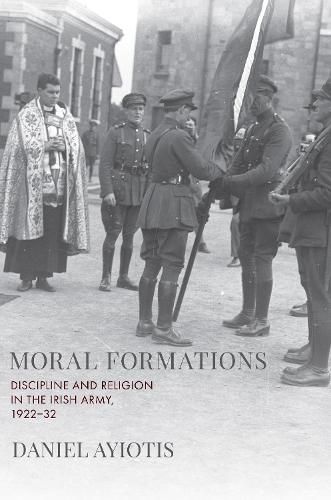Readings Newsletter
Become a Readings Member to make your shopping experience even easier.
Sign in or sign up for free!
You’re not far away from qualifying for FREE standard shipping within Australia
You’ve qualified for FREE standard shipping within Australia
The cart is loading…






Moral Formations: Discipline and Religion in the Irish Army is a comprehensive exploration of the transformation of the Irish Army from the Civil War to the Eucharistic Congress. Authored by Daniel Ayiotis, this comprehensive work explores the intricate relationship between discipline, religion, and the army, shedding light on the challenges faced and the values that were required of soldiers, primarily manliness, clean living, chivalrous spirit and, to an extent, a religious fervor.
The author highlights the importance of discipline, religion, and morality in shaping the army's loyalty to the country and the challenges faced in maintaining these values. This examination also raises important questions about the role of religion in shaping the behavior and actions of the army and the influence of religious instruction on young soldiers. It also acknowledges the role of the Irish Army as a government institution and the values that were instilled during its early years of formation. Overall, this work provides a fascinating insight into the complex relationship between discipline, religion, and the army. It is a must-read for anyone interested in the history of the Irish Army and the values that have shaped its identity over time.
$9.00 standard shipping within Australia
FREE standard shipping within Australia for orders over $100.00
Express & International shipping calculated at checkout
Moral Formations: Discipline and Religion in the Irish Army is a comprehensive exploration of the transformation of the Irish Army from the Civil War to the Eucharistic Congress. Authored by Daniel Ayiotis, this comprehensive work explores the intricate relationship between discipline, religion, and the army, shedding light on the challenges faced and the values that were required of soldiers, primarily manliness, clean living, chivalrous spirit and, to an extent, a religious fervor.
The author highlights the importance of discipline, religion, and morality in shaping the army's loyalty to the country and the challenges faced in maintaining these values. This examination also raises important questions about the role of religion in shaping the behavior and actions of the army and the influence of religious instruction on young soldiers. It also acknowledges the role of the Irish Army as a government institution and the values that were instilled during its early years of formation. Overall, this work provides a fascinating insight into the complex relationship between discipline, religion, and the army. It is a must-read for anyone interested in the history of the Irish Army and the values that have shaped its identity over time.